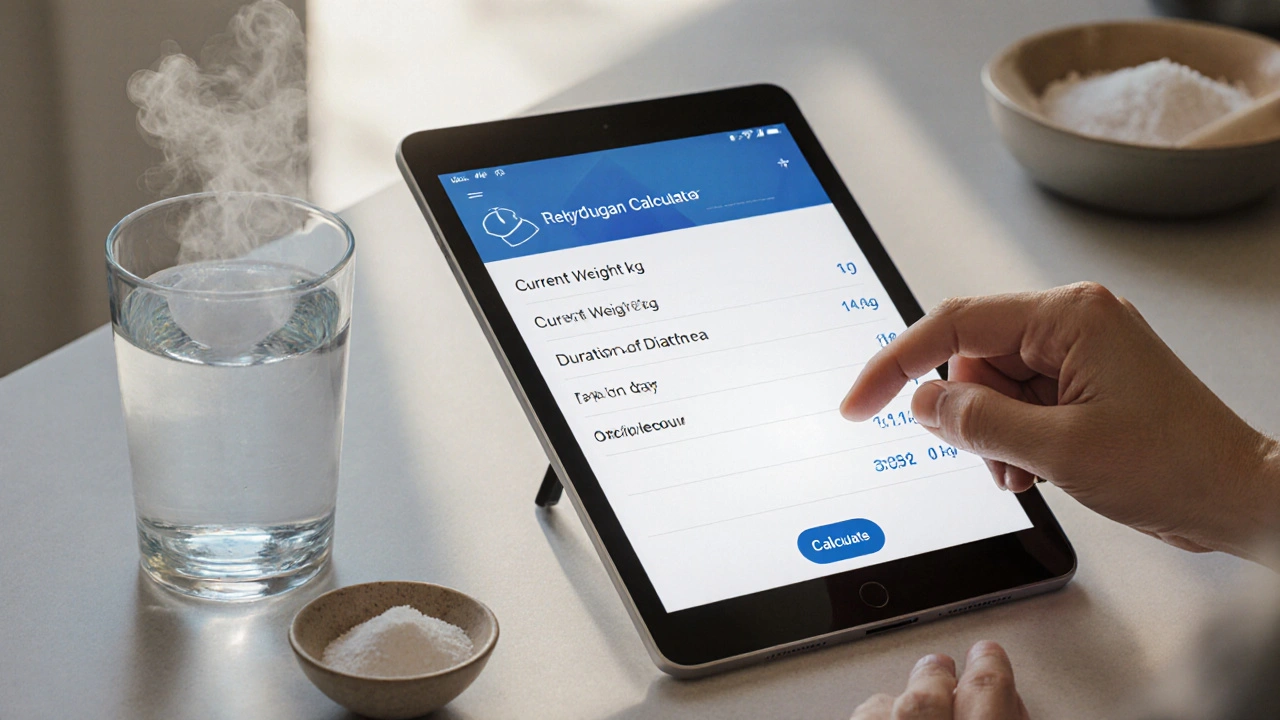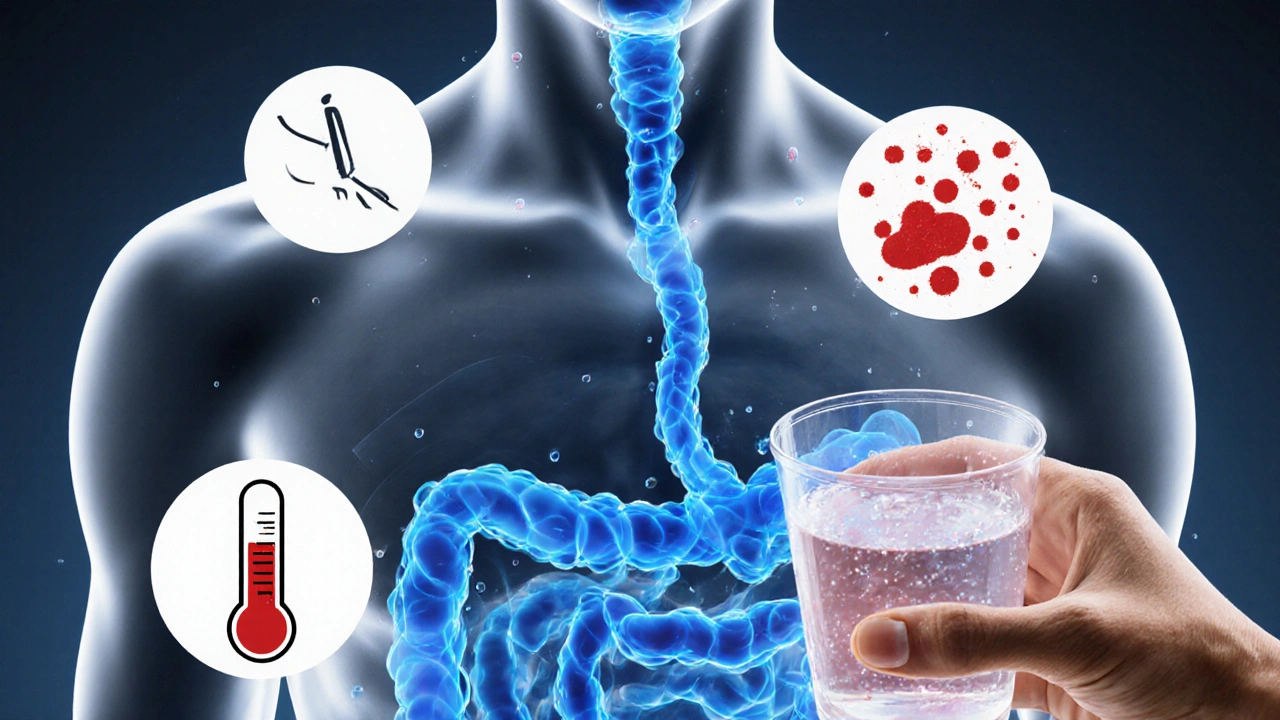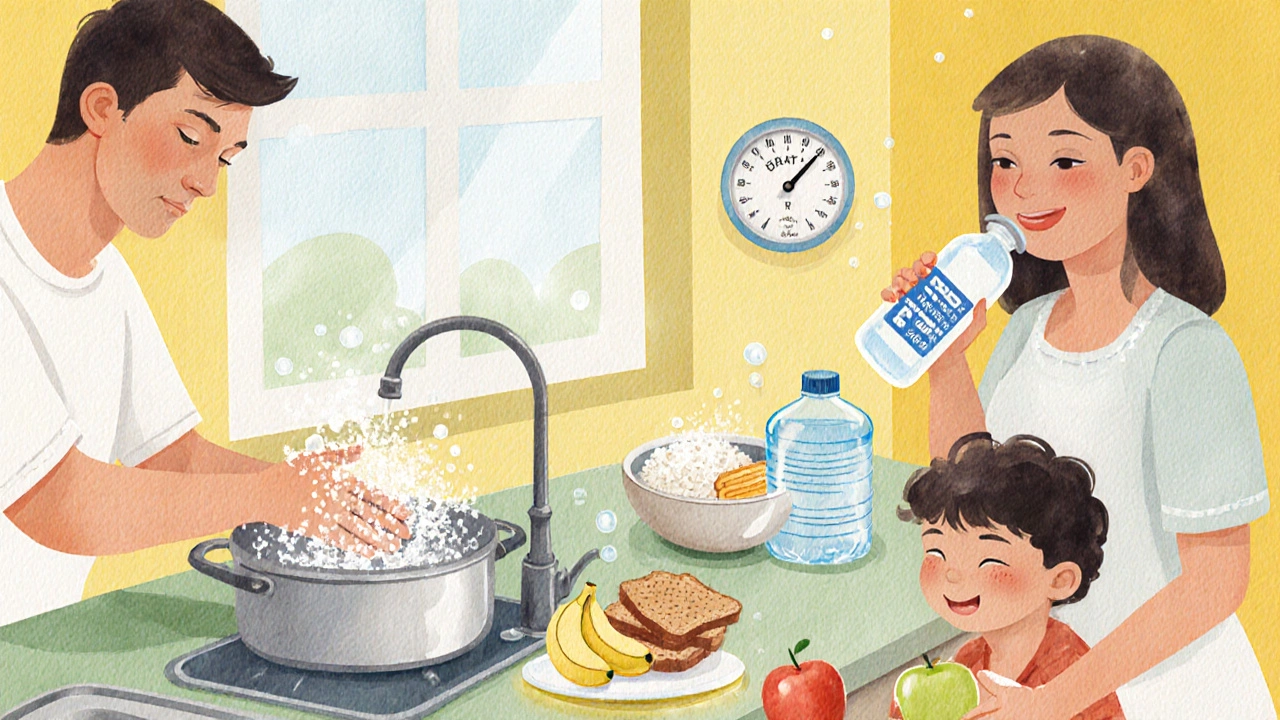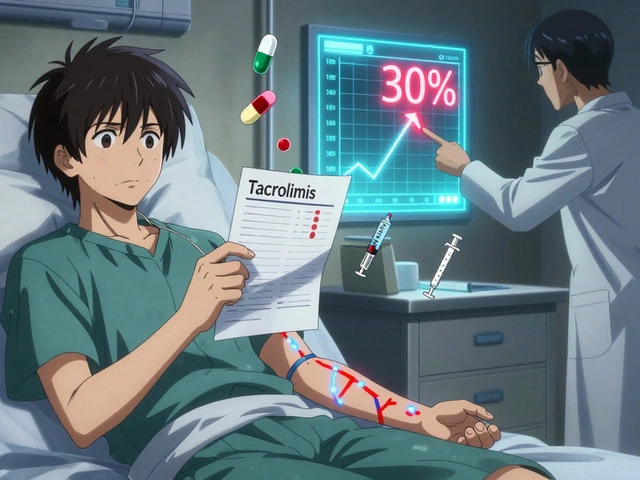
Acute Diarrhea Weight Loss Calculator
When your stomach goes into overdrive and you start losing weight fast, the first question is: is this just a nasty bout of Acute Diarrhea or a sign of something more serious? Below we break down why sudden weight loss often follows a rapid diarrheal episode, what red‑flag signs mean you should see a doctor, and practical steps to keep your gut-and your waistline-stable.
Key Takeaways
- Acute diarrhea typically lasts less than two weeks; prolonged cases need medical evaluation.
- Weight loss is common during an episode due to fluid loss and reduced nutrient intake.
- Dehydration and electrolyte imbalance are the biggest health risks.
- Simple hygiene, safe food practices, and early oral rehydration can prevent most bouts.
- Seek care if you have blood in stool, fever over 101.5°F, or symptoms lasting beyond 14 days.
What Is Acute Diarrhea?
Acute diarrhea is the sudden onset of loose, watery stools that occur three or more times a day and usually resolve within a short period-often under two weeks. It’s most often triggered by an infection (viral, bacterial, or parasitic), food poisoning, or a reaction to medication such as antibiotics. Unlike chronic diarrhea, which persists for months, acute episodes are self‑limiting for most healthy adults.
Why Does Weight Loss Occur?
During an acute episode, the body loses a lot of fluid, electrolytes, and calories:
- Weight Loss can happen within a single day if you’re shedding more water than you’re drinking.
- Reduced appetite means fewer calories absorbed, compounding the deficit.
- Malabsorption caused by intestinal inflammation can prevent nutrients from entering the bloodstream.
The good news? Most of the loss is water weight and is quickly regained with proper rehydration and nutrition.
When Is It Normal?
For most people, a brief period of diarrhea with mild weight loss is normal if:
- The episode lasts less than 14 days.
- Stools are watery without blood or mucus.
- There’s no high fever (above 101.5°F) or severe abdominal pain.
- Hydration can be maintained with fluids.
If all these boxes are checked, the condition will likely resolve on its own.
Red‑Flag Signs: When to See a Doctor
Although most cases are benign, watch out for these warning signals:
- Blood or pus in stool-possible invasive bacterial infection.
- Fever higher than 101.5°F (38.6°C) lasting more than 24 hours.
- Persistent vomiting that prevents fluid intake.
- Signs of severe dehydration: dry mouth, dizziness, low urine output, or rapid heartbeat.
- Weight loss exceeding 5% of body weight in a week.
These indicate that medical intervention-such as prescription antibiotics or IV fluids-may be needed.

Core Prevention Strategies
Most acute cases stem from preventable exposures. Below is a concise checklist of everyday habits that dramatically cut risk.
- Wash hands with soap for at least 20 seconds before eating or handling food.
- Ensure water is treated-boil, filter, or use certified bottled sources when traveling.
- Cook meats thoroughly; use a food thermometer to reach 165°F (74°C) for poultry.
- Store leftovers within two hours and refrigerate at 40°F (4°C) or below.
- Avoid unpasteurized dairy products and raw sprouts, which harbor bacteria.
These habits are simple but surprisingly effective.
Managing an Episode: Rehydration and Nutrition
When diarrhea strikes, focus on replacing lost fluids and electrolytes before worrying about solid food.
Oral Rehydration Solution (ORS) is the gold standard. An effective homemade ORS can be made with 1 liter of clean water, 6 teaspoons of sugar, and half a teaspoon of salt. This blend restores sodium, potassium, and glucose in the right proportions.
After fluid balance is stable, re‑introduce bland foods using the BRAT diet (Bananas, Rice, Applesauce, Toast) and gradually add probiotic‑rich items like yogurt or kefir. Probiotics-Probiotics-help restore healthy gut flora and may shorten the illness by 1‑2 days.
Continue normal hydration, aim for clear urine, and monitor weight. Most people regain lost weight within 48‑72 hours once fluid intake normalizes.
Comparison Table: Common Triggers vs Primary Prevention
| Trigger | Typical Duration | Primary Prevention |
|---|---|---|
| Viral gastroenteritis (e.g., norovirus) | 1‑3 days | Hand washing, surface disinfection |
| Food poisoning (Salmonella, E. coli) | 2‑7 days | Cook foods thoroughly, avoid cross‑contamination |
| Travelers’ diarrhea | 3‑5 days | Drink treated water, eat cooked foods, use prophylactic probiotics |
| Antibiotic‑associated diarrhea | 5‑10 days | Take probiotics during/after antibiotics |
Special Populations
Children, older adults, and people with chronic illnesses are more vulnerable to dehydration and rapid weight loss. For infants, breast milk or age‑appropriate formula should be continued, and ORS can be added in small amounts. Elderly individuals may need electrolyte‑rich drinks like sports drinks or commercially prepared ORS, as they often have reduced thirst perception.
When to Use Over‑the‑Counter Medications
Anti‑motility agents such as loperamide can reduce stool frequency, but they should be avoided if you have a fever or blood in the stool, as they may trap harmful organisms. Bismuth subsalicylate (Pepto‑Bismol) can help with mild nausea and occasional diarrhea, but again, use only when bacterial infection is unlikely.
Bottom Line
Acute diarrhea can cause noticeable weight loss, but for most healthy adults it’s a temporary water‑weight shift that resolves with proper fluid replacement and simple hygiene. Recognize the red‑flag signs, act fast with oral rehydration, and adopt everyday preventive habits to keep your gut-and your weight-in check.

Frequently Asked Questions
Can I lose permanent weight from a bout of acute diarrhea?
No. The weight lost during an episode is mostly water and electrolytes. Once you rehydrate and eat normally, the weight returns within a few days.
Do I need to see a doctor if I’m losing weight but feel fine otherwise?
If the weight loss exceeds 5% of your body weight in a week, or if you notice signs of dehydration (dry mouth, dizziness, low urine output), seek medical care even if you feel otherwise okay.
Is it safe to use loperamide for diarrhea caused by food poisoning?
Generally, no. Loperamide can trap bacteria and toxins in the gut, potentially worsening the infection. It’s better to let the body flush out the pathogen while staying hydrated.
How often should I replace my fluids during a severe episode?
Aim for small sips every 5‑10 minutes-about 200‑250ml each time. Overloading the stomach can trigger vomiting, which wastes the fluids you’re trying to keep in.
Can probiotics prevent future episodes of acute diarrhea?
Regular use of a multi‑strain probiotic, especially after antibiotics, can help maintain a balanced gut microbiome, reducing the frequency of mild diarrheal bouts.
Write a comment
Your email address will not be published.





18 Comments
While the article provides a decent overview, it glosses over the critical fact that electrolyte replenishment is not merely a suggestion but a necessity to prevent life‑threatening hyponatremia. The reliance on generic ORS recipes betrays a lack of nuance, especially for patients with comorbidities. Moreover, the claim that weight loss is "mostly water weight" ignores the metabolic catabolism that can occur in prolonged cases. 😒
Let’s turbo‑charge your gut game! 🚀 Deploy a rapid‑absorption protocol: high‑osmolarity ORS, zinc supplementation, and probiotic inoculation within the first 24 hours. These evidence‑based tactics synergize to truncate the diarrheal cascade and preserve lean mass. Remember, hydration is the MVP, but electrolytes are the star players. 🌟
Sounds like the basics are solid. Just don’t forget to sip water often.
Honestly, the whole "just drink ORS" advice is oversimplified. Who’s to say the water isn’t contaminated? It’s an invitation for hidden pathogens. This piece could mislead the naive.
The government’s push for homemade ORS is a classic distraction tactic. They want you to think the problem is merely dehydration, while they’re quieting the real cause-industrial food additives. Keep your eyes open, and verify water sources independently. Precision matters.
Intriguing read! I’m curious about the exact electrolyte ratios in the suggested homemade solution-does the 6 tsp sugar to ½ tsp salt formula truly match WHO standards? Also, could adding a pinch of potassium chloride improve outcomes for severe cases? Looking forward to a deeper dive.
Great info, thanks.
First off, let’s acknowledge how distressing an acute diarrheal episode can be; the sudden loss of fluids feels like your body is suddenly siphoning away its own life force, and that sensation alone can trigger panic. The key to navigating this storm is a methodical approach: start with small sips of a properly balanced oral rehydration solution, because gulping large amounts too quickly often leads to vomiting, which only worsens dehydration. 🌊
Next, consider the electrolyte composition; sodium and potassium are the primary players, and the classic 6 tsp sugar with ½ tsp salt recipe provides a decent baseline, yet many clinicians recommend adding a pinch of baking soda to address metabolic acidosis. 🧂
While you’re rehydrating, keep an eye on urine output-clear or light‑yellow urine is a reliable sign that you’re on the right track. If you notice dark urine, it’s a red flag that you need to increase intake or seek medical help.
Equally important is to monitor your weight; a rapid drop of more than 5 % of body weight within a week should set off an alarm, as it may indicate not just fluid loss but also underlying malabsorption.
Nutrition wise, after the first 12‑hour window of fluid replacement, you can gently re‑introduce the BRAT diet-bananas, rice, applesauce, toast-because these foods are low‑residue and help to firm up stools without overtaxing the gut.
However, don’t stay confined to BRAT forever; as soon as tolerance improves, incorporate probiotic‑rich foods such as yogurt or kefir, which can expedite the restoration of a healthy microbiome.
Don’t forget about the role of rest; a stressed nervous system can exacerbate gut motility, so adequate sleep and relaxation are essential components of recovery.
If you have a fever over 101.5 °F, it’s advisable to avoid anti‑motility agents like loperamide, because they can trap pathogens inside the intestines, potentially worsening the infection.
Instead, focus on antipyretics like acetaminophen, and keep a thermometer handy to track trends.
For travelers, always treat water-boil it, filter it, or use chlorine tablets-because contaminated water is a leading cause of acute diarrhea abroad.
And remember, hand hygiene isn’t just a recommendation; it’s a proven barrier against viral gastroenteritis-wash for at least 20 seconds before meals and after using the restroom.
If you notice blood in stool, the situation escalates to a possible invasive bacterial infection, and prompt medical evaluation is non‑negotiable.
In such cases, antibiotics may be warranted, but only under professional guidance to avoid resistance.
Finally, after you’ve recovered, consider a maintenance plan: regular probiotic supplementation and a balanced diet rich in fiber can fortify your gut against future assaults. 🌱
Stay hydrated, stay vigilant, and trust your body’s signals-if something feels off, don’t hesitate to reach out to a healthcare provider.
Swift, pragmatic advice-hydrate, watch electrolytes, and heed red flags. 🍃
I appreciate the concise steps, but could you clarify the recommended volume of ORS per kilogram of body weight?
good info thanks
Stay positive, sip slowly, and you’ll be back on track soon! 😊
In the grand theatre of the body, diarrhea is but a fleeting act, a sudden surge that strips away the veneer of stability. Yet, behind this transient drama lies a profound lesson: the resilience of human physiology when confronted with chaos. We must honor the simple act of sipping water as a ritual of rebirth, each drop a testament to survival. And as we restore balance, let us not forget the quiet wisdom of humility that illness imparts.
I dnt think the artcile getts the importence of electrolye balance enough. It is crutial 4 proper recovry 😡
The guidance presented is fundamentally sound, yet I would advise supplementing the sodium‑chloride formulation with a modest potassium source to mirror physiological plasma composition. Additionally, strict adherence to sanitary water practices remains paramount, particularly in regions where municipal treatment may be suboptimal. Please consider these refinements in future revisions.
Yo, keep it up! just drink the mix and dont push urself too hard, u’ll be fine.
This article totally misses the mark on seriousness-people think they can just “sip water” and ignore the deadly risks! 📢🔥
We grapple with the impermanence of fluid loss, yet find solace in the rhythm of restoration. 🌊🧭
Let us approach each sip with mindful intent, honoring the body’s quiet plea for balance.
In this shared journey, empathy becomes our compass.